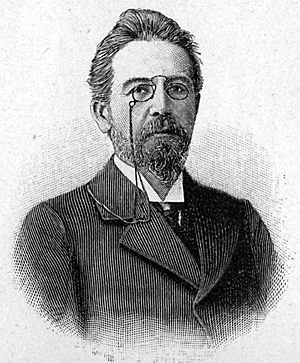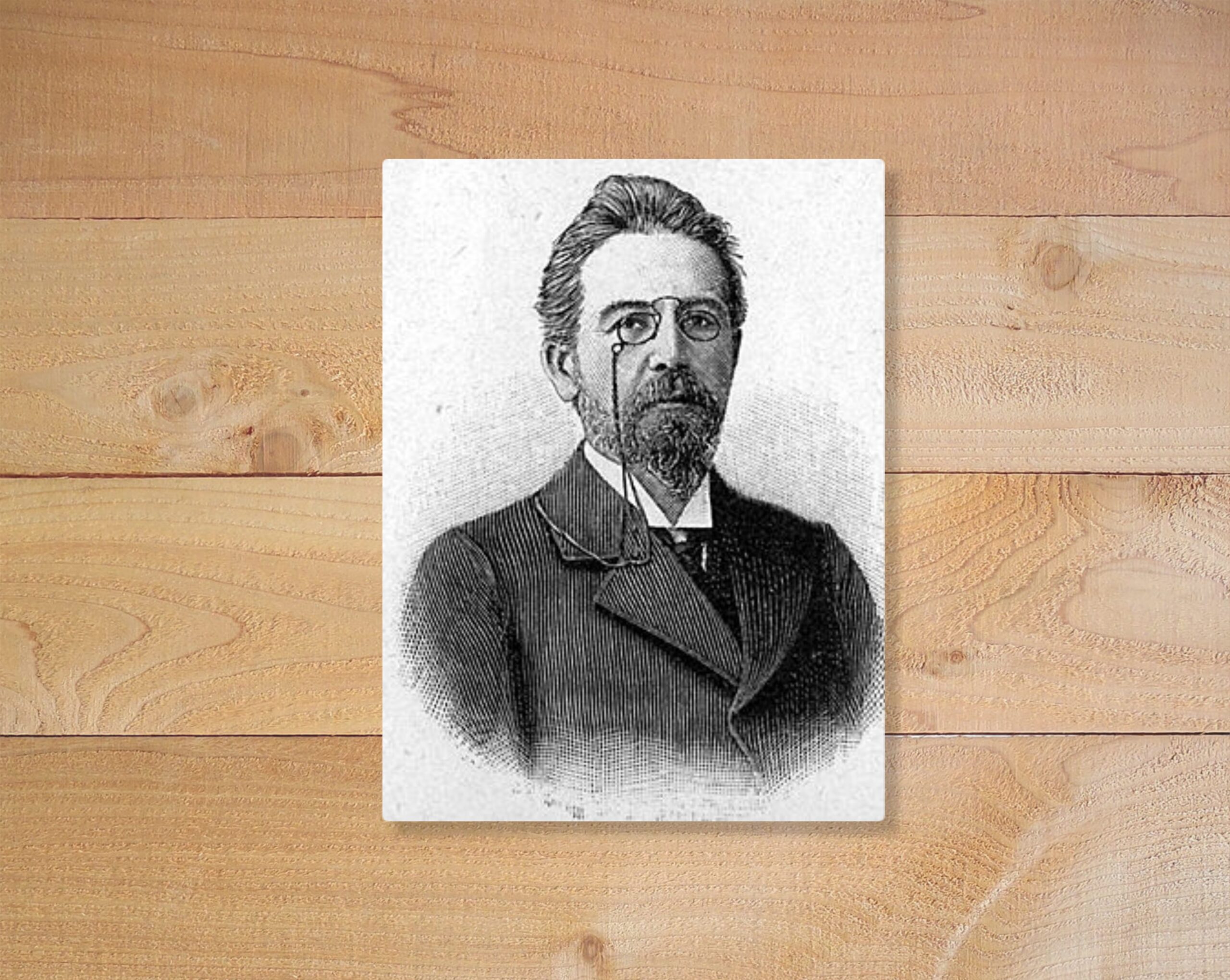Table of Contents
Introduction.

Chekhov, a Russian writer active in Russia after the death of Dostoevsky, plunged the country into a dark pre-revolutionary period from the 1880s onward.
By studying Chekhov, we can see the historical background of the time and how Dostoevsky and Tolstoy were perceived by the Russians. This is also significant for studying Dostoevsky.
So this time, I would like to give you a brief idea of what kind of person Chekhov was, using a chronology of his life.
What kind of person is Chekhov anyway?
Before looking at the chronology, we would like to take a brief look at who Chekhov was in the first place.
Chekhov was born in 1860 in the port town of Taganrog in southern Russia.
Chekhov's family was originally serfs. Chekhov's father owned a store, but being a serf and a merchant was of great significance to Chekhov as well.
Herein lies a major difference with Dostoevsky, Tolstoy, and Turgenev, writers from aristocratic backgrounds.
And a very important point to know about Chekhov is that he was a doctor. He is known all over the world as a writer, but he was a doctor and a writer, or a writer and a doctor, and he wrote his works all his life.
Especially during his medical school days and for a while after he became a writer, he even managed to write to make ends meet in order to support his financial situation. Even after his debut as a writer, Chekhov never gave up his doctor's career.
The doctor will look at the world scientifically. This dispassionate perspective will become a characteristic of Chekhov's literature.
A doctor and writer from a peasant family.
This is a very important aspect of knowing Chekhov.
Let's take a look at the chronology from here.
Chekhov Chronology
1860 (age 0) Born in Taganrog as the third son.
1876 (age 16) Bankruptcy of father's store. The family fled to Moscow in the night. Chekhov remained in Taganrog and supported himself as a private tutor for three years until he graduated from junior high school.
1877 (age 17) He reads humor magazines frequently. Turgenev.The Virgin Land.TolstoyAnna Karenina."
1879 (age 19) Graduated from Taganrog Middle School. After receiving a city scholarship and leaving for Moscow in August, he enrolled at Moscow State University Medical School, where he began submitting short stories to magazines around October, and in December his short story "Letter to a Learned Neighbor" was accepted by "Tonbo" magazine, which marked the beginning of Chekhov the writer.
1880 (age 20) A Letter to a Neighboring Scholar" was published in "Tonbo" magazine. Dostoevsky.The Brothers Karamazov.completion
1881 (age 21) Mainly under the pen name "Anton Chekhonte," he contributed a series of humorous short stories. Thereafter, his writing activities flourish. Dostoevsky dies. Assassination of Tsar Alexander II. The Russian government intensifies its repression of Dostoevsky.
1883 (age 23) Turgenev died. Nietzsche.Zarathustra: The Tale of Zarathustra" (The Tale of Zarathustra)
1884 (age 24) Graduated from Moscow State University Faculty of Medicine. Beginning of Chekhov the physician. First hemoptysis at the end of the year. From then on, the symptoms of tuberculosis gradually appear.
1886 (age 26) Received a letter of advice and encouragement from Grigorovich, an elder of the literary world, warning against "abuse of talent". He reads Dervin. From this time on, he began to produce many excellent works. The Holy Night", "Misfortune", "The Witch", "Agafia", etc.
1887 (age 27) Loved reading "Anna Karenina". Travels to her hometown of Taganrog. Impressions from this trip lead to his masterpiece "The Steppe". Writes a successful play "Ivanov", which is performed at the Korsh Theater. The Enemy, Typhus, and Happiness.
1888 (age 28) 'ThegrasslandsIn October, receives the Pushkin Prize for his collection "In the Twilight". Makes acquaintance with the composer Tchaikovsky.
1889 (age 29) Stayed in Petersburg. He takes care of his second brother Nikolai, who is ill, but dies. He died at the age ofboring story' "hot noodles in broth'-' (used in place of '-')
1890 (age 30) On April 21, he leaves for Sakhalin; on July 9, he arrives in Sakhalin; in October, Japanese Consul KuseoriginalOn October 13, he leaves for home from South Sakhalin, arriving in Moscow on December 8. Zola, The Beast
1891 (age 31) 'TheduelWrote "Women" and "The Wife". Famine in Russia. Construction of the Trans-Siberian Railway begins.
1892 (age 32) From the beginning of the year, he worked hard to help the starving, and in July he participated in a cholera quarantine. He is also the author of the famous medium-length novelward 6Presented "The Tchudra". Debut in Gorky's "Makar Chudra".
1893 (age 33) 'TheSakhalin IslandStarted writing
1894 (age 34) 'TheRothschild's Violin' "monk in blackThe Language Teacher. The Enthronement of Nicholas II, the Last Tsar of Russia
1895 (age 35) Visit Tolstoy in Jasnaya Polyana.
1896 (age 36) The House with a Mezzanine Floor. The play, "seagullThe first performance of "The Greatest of All" at the Alexandrinsky Theatre in Petersburg was a disaster. However, two years later, in 1896, he achieved phenomenal success with a lecture at the Moscow Art Theatre.
1897 (age 37) Hemoptysis at the end of March. Tolstoy comes to visit him and they discuss art and immortality. He becomes interested in the Dreyfus Affair in France.
1898 (age 38) France defends Dreyfus, who was falsely accusedPeople's author Emile ZolaI feel strong sympathy for the 'man in a box' "currant' "About Love'-' (used in place of '-')
1899 (age 39) Tolstoy's comment on Chekhov's "pretty girlHe praises the "The 'Uncle Vanya.The first performance of TheWife with dog'-' (used in place of '-')
1900 (age 40) He was elected as an honorary member of the Academy. He is the author ofvalley'-' (used in place of '-')
1901 (age 41) 'Thethree sistersFirst performance of "The Greatest of All Time". Married Oniga Knippel.
1902 (age 42) He donated many books to the Taganrog Library. Gorky was appointed as an honorary member of the Academy, but he declined the honorary membership himself in protest against the Czar's arbitrary revocation of his membership on the grounds that he was a revolutionary. GorkyBottom of the Bottoms."
1903 (age 43) "A Fiduciary Affiliation.
1904 (age 44)'Thecherry orchardThe first performance of "The Last of Us" was held at the Tokyo Metropolitan Museum of Art. His illness worsens and he dies on July 2. Outbreak of Russo-Japanese War.
My selection of Chekhov's recommended works
Chekhov has produced an astonishingly large body of work. While Dostoevsky and Tolstoy produced massive full-length novels, Chekhov's real strength lies in his short and medium-length novels and plays.
Most of these stories are compact and easy to read. The beauty of this is that you can pick them up quickly and read them over and over again whenever you feel like it. This is not the case with Dostoevsky or Tolstoy.
I have written about the important works in the timeline above, but below are my personal recommendations that I will be introducing on my blog.
1883 "Thepeople in costume'-' (used in place of '-')
1888 "Thedeserted land", "light'-' (used in place of '-')
1889 "Theboring story", "hot noodles in broth'-' (used in place of '-')
1891 "Theduel'-' (used in place of '-')
1892 "Theward 6'-' (used in place of '-')
1894 "Themonk in black", "Rothschild's Violin", "Sakhalin Island'-' (used in place of '-')
1896 "Theseagull'-' (used in place of '-')
1898 "TheThe Man in the Box", "currant", "About Love' "pretty girl'-' (used in place of '-')
1899 "TheUncle Vanya.", "Wife with dog'-' (used in place of '-')
1900 "Thevalley'-' (used in place of '-')
1901 "Thethree sisters'-' (used in place of '-')
1902 "Thehigh Buddhist priest'-' (used in place of '-')
1904 "Thecherry orchard'-' (used in place of '-')
summary
Chekhov was born into a serf family, and despite living in poverty, he studied hard and became a doctor.
Despite being in an environment that would normally cause him to lose control, Chekhov did not go down that road at all. There was an extraordinary willpower and self-discipline within him.
And some of you may be surprised by this chronology.
Chekhov traveled to Sakhalin Island in 1890 at the age of 30.
I also interact with Japanese people at that time.
Chekhov went on a research trip to Sakhalin Island, then known as Hell Island. It was a prison island where exiles were sent. Chekhov set out to see for himself the cruelty of mankind and the injustice of society. At the time, Chekhov had just achieved a solid position in the literary world, but he was willing to throw it all away to go on a trip. Moreover, his chronic tuberculosis was showing signs of worsening. Even so, Chekhov was still determined to go on his journey. Chekhov's mental strength was no mean feat.
We will return to the Sakhalin Island trip in a later article, but this event occupies a very important place in our knowledge of Chekhov as a person.
Chekhov is a very interesting writer. And of course, his works are also very strong. At first I intended to read only Chekhov's most famous plays, such as "The Seagull" and "The Cherry Orchard," but the more I learned about Chekhov, the more I was drawn into his worldview. As a result, I ended up reading not only his plays but also his best-known works of fiction.
To be honest, I think it is definitely more interesting to actually see a play on stage than to read about it in a book. It is of course interesting to read it in a book, but there are many parts that are difficult to convey. Moreover, Chekhov does not use easily understandable tumultuous incidents or flashy lines like Shakespeare. Instead, Chekhov uses small events that occur in everyday life as the subject matter for his plays. I felt that this is quite difficult to do in a book. I will talk about this in another article.
What I really felt while reading Chekhov is that his novels are gruesome. His plays may be the most famous, but to me, who only knew him through his books, his novels were so destructive. It was his novels that were truly terrifying. This is my honest opinion.
It is precisely in Japan today that Chekhov's works should be more widely disseminated. I felt the same way when I read the French writer's Zola. I would like everyone to get to know Chekhov. I have met a terrible writer (in a good way, of course).
The above is a list of Chekhov's life and recommended works - with reference to chronology.
Next Article.
Click here for a list of Chekhov's recommended works.
Related Articles





































